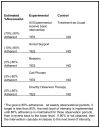Tailored treatment for HIV+ persons with mental illness: the intervention cascade
- PMID: 23673886
- PMCID: PMC3667202
- DOI: 10.1097/QAI.0b013e318293067b
Tailored treatment for HIV+ persons with mental illness: the intervention cascade
Abstract
The public health literature demonstrates disturbingly high HIV risk for persons with a serious mental illness, who are concurrently comorbid for substance abuse. Many HIV positives have not been tested and therefore do not know their status, but for individuals who are triply diagnosed, adherence to HIV treatment results in meaningful reductions in viral loads and CD4 counts. Barriers to treatment compliance are reviewed, low-threshold/low-intensity community-based interventions are discussed, and preliminary evidence is presented for the efficacy of the intervention cascade, defined as an integrated intervention delivered by specially trained nurses who individualize a treatment compliance intervention in real time as an adaptive response to demand characteristics of the individual.
Conflict of interest statement
Figures
References
-
- Bandura A. Regulation of cognitive processes through perceived self-efficacy. Developmental Psychology. 1989;25:729–735.
-
- Blank MB, Mandell DS, Aiken L, Hadley TR. Co-occurrence of HIV and serious mental illness among Medicaid recipients. Psychiatric Services. 2002;53:868–873. - PubMed
-
- Conviser R, Pounds MB. The role of ancillary services in client-centered systems of care. Aids Care-Psychological and Socio-Medical Aspects of Aids/HIV. 2002;14:S119–S131. - PubMed
Publication types
MeSH terms
Grants and funding
LinkOut - more resources
Full Text Sources
Other Literature Sources
Medical
Research Materials




